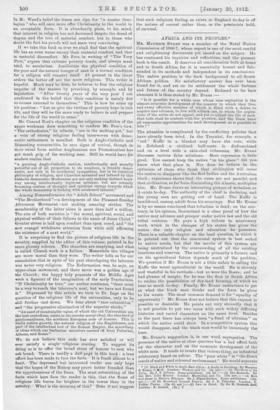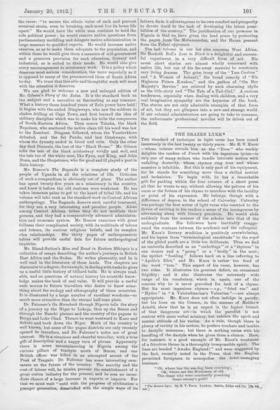AFRICA AND ITS PEOPLES.* MR. Manlius EVANS was a member
of the Natal Native Commission of 1906-7, whose report is one of the most candid and enlightening documents yet issued on the subject. He has continued his inquiries and reflections, and the present book is the result. It deserves all consideration both at home and in South Africa, for it is essentially honest and fair- minded in its methods and independent in its conclusions. The native problem is the dark background to all South African politics. No satisfactory answer has ever been found for it, and yet on its settlement the whole fortune and future of the country depend. Reduced to its bare elements it is thus stated by Mr. Evans :—
" Is it possible for a white race whose race aspiration is the utmost economic development of the country in which they live, and every effective member of which is filled with a desire to : acquire and advance, to live with a black one, to whom the aspira- tions of the white do not appeal, and yet so adjust the life of each that both shall be content with the position, and the black have all reasonable opportunities for such development as is possible to him ? "
The situation is complicated by the conflicting policies that have already been tried. In the Transkei, for example, a " red " Kaffir in a blanket may have the vote, while in Zululand a civilized half-caste is disfranchised and on a level with a skin-clad tribesman. Mr. Evans discusses various false solutions. Mere repression is little good. You cannot keep the native " in his place " till you know what that place is. Nor does he believe in the optimism of those who think that civilization will cause the native to disappear like the Red Indian and the Australian black ; experience shows that the cases are not parallel, and that civilization, so fai.•;from diminishing the Abantu, multiplies him. Mr. Evans draws an interesting picture of tribalism as it exists to-day., The authority of the chief is declining, and the young men are getting out of hand. The Kaffir is bewildered, uneasy, adrift from his moorings. But Mr. Evans is by no means convinced that tribalism is dead; on the con- trary, in his opinion, Basutoland is a clear proof of how the native may advance and prosper under native law and the old tribal customs. He pays a high tribute to missionary work, which in the changes of his status has given the native the only religion and education he . possesses. There is a valuable chapter on the land question, in which it is pointed out that the communal system is best suited to native needs, but that the merits of this system are being neutralized by the overcrowding of all the existing locations and reserves. The native is primarily a farmer, and on his agricultural future depends much of the problem. We question if Mr. Evans is not a little unfair in calling the Kaffir the worst agriculturist in the world. He is slovenly and wasteful in his methods—but so were the Boers ; and lie had gleams of insight, for he was the first in South Africa to realize the possibilities of dry-land farming, of which we hear so much to-day. Finally, Mr. Evans endettiours to get at what the Week man thinks and the form he gives to his wants. The most common demand is for "equality of opportunity." Mr. Evans does not believe that this request is possible or desirable. Ho points out very shrewdly that it is not possible to put two races with such widely differing histories and varied characters on the same level. Besides in the past there has always been "a fund of altruism" on which the native could draw. In a competitive system this would disappear, and the black man would be immensely the loser.
Mr. Evans's suggestion is, in one word, segregation. The presence of the native at close quarters has a bad effect both on the character and on the economic development of the white man. It tends to create that vicious thing, an industrial aristocracy based on colour. The "poor white " is " the direct result of native and coloured environment." He would separate
* (1) Black and White in South•East Africa: A Study in Sociologv. By Maurice S. Evans, C.M.G. London : Wyman and Co. [6s net.]—(2) Ilse Story of the Zulus. By J. Y. Gibson, &tine publishers. 17a. 6d. I--,(8) The Buganda. By the Rev, John Roscoe. London : Macmillan and Co. Ms. net, I —01 Man and Beast in Eastern Ethiopia. By J. Bland•Sutton. Same publishers. (12s. net.]—(5) On Horseback through Nigeria. By 3. D. Falconer. London: T. Fisher tInwin. 12s. 6d. net.]—(6) Loco in 1:14014. By Sir H. Heaketh Bell. London E. Arnold. 06:1 the races: "to secure the ethnic value of each and prevent eventual strain, even to breaking, each must live its home life apart." He would have the white man continue to hold the -sole political power ; he would remove native questions from parliamentary meddling and delegate native administration in large measure to qualified experts. He would increase native reserves, so as to make them adequate to the population, and within these he would give them a measure of self-government and a generous provision for such education, literary and industrial, as is suited to their needs. He would also give every encouragement to missionary work. It is a policy which deserves most serious consideration, the more especially as it is opposed to many of the preconceived ideas of South Africa to-day. We trust that this able and-thoughtful work will meet With the attention it deserves.
We are glad to welcome a new and enlarged edition of Mr. Gibson's Story of the Zulus. It is the standard book on the subject and a narrative as fascinating us any romance. What a history those hundred years of Zulu power have held! It begins with the exiled Dingiswayo, who saw the soldiers in shakos drilling at Cape Town, and first learned the idea of military discipline which was to make his tribe the conquerors of South-Eastern Africa. Then comes Tsbaka, the black Napoleon, who scattered the native clans till his word was law to the Zambezi. Dingaan followed, whom the Voortrekkers defeated, and the fat Panda, and last Cetshwayo, with whom the dynasty ended in blood and ruin. Only the other day died Dinizulu, the last of the " Black House." Mr. Gibson tells the tale of the black aristocracy vividly and well, and the tale too of the white men, like Fynn, and King, and John Dunn, and the Shepstones, who for good and ill played a part in Zulu history.
• Mr. Roscoe's The Baganda is a complete study of the people of Uganda in all the relations of life. Criticism of such a compendium is obviously out of place. The author has spent twenty-five years as a missionary in the country, and knew it before the old customs were weakened. He has taken immense pains to get to the heart of tribal life, and his volume will take rank as the standard work on Central African anthropology. The Baganda deserve such careful treatment, for they are a very interesting and peculiar people. Alone among Central African tribes they do not mutilate their persons, and they had a comparatively advanced administra- tion and economic system. Mr. Roscoe examines with great fullness their complicated society, with its multitude of taboos and totems, its curious religious beliefs, and its complex clan relationships. His thirty pages of anthropometric tables will provide useful data for future anthropological inquiries.
Mr. Bland-Sutton's Man and Beast in Eastern Ethiopia is a collection of essays describing the author's journeys in British East Africa and the Sudan. He writes pleasantly, and he is well read in the literature of these lands. The chapters are discursive to a degree; for example, in dealingwith tusks he gives us a useful little history of billiard-bulls. He is always read. able, and on questions of natural history his scientific know- ledge makes the book of real value. It will provide a useful vade mecum to future travellers who desire to know some- thing about the zoology and ethnography of these countries. It is illustrated by a large number of excellent woodcuts—so much more attractive than the eternal half-tone plate.
Dr. Falconer's On Horseback through Nigeria tells the story of a journey up the Niger to Lokoja, then up the Benue and through the Bauchi plateau and the country of the pagans to Borgu and Lake Chad. Thence he went westward to Kano and Sokoto and back down the Niger. Muth of the country is well known, but some of the pagan districts are only recently opened to travellers, and Dr. Falconer's notes are of great interest. He is a vivacious and cheerful traveller, with a true gift of description and a. happy turn of phrase. Apparently there is some mountaineering in Nigeria among the curious pillars of trachyte north of Benue, and one British officer was killed in an attempted ascent of the Peak of Tangale. Dr. Falconer has some interesting coin- wents on the future of the country. The scarcity and the cost of labour will, he thinks, prevent the establishment of a great cotton industry for the present, and he sees no imme- diate chance of a large increase in exports or imports. For that we must wait " until with the progress of civilization. a younger generation, dissatisfied with the simple ways of its fathers, finds it advantageous to its own comfort and prosperity to devote itself to the task of developing the latent possi- bilities of the country." The justification of our presence in Nigeria is that we have given the land peace by protecting the pagan from the Mohammedan, and the Hausa peasant from the Fulani oppressor.
The last volume in our list also concerns West Africa. Sir Hesketh Bell's Love in Black is a delightful and success- ful experiment in a very difficult form of art. His seven short stories are almost wholly concerned with native life, but out of his far-away material he constructs very living dramas. The grim irony of the " Yam Custom" and "A Woman of Ashanti," the broad comedy of "His Highness Prince , Kwakoo," and the pathos of "On Her Majesty's Service" are relieved by such charming idylls as the title-story and "The Tale of a Tail-Girl." A curious tenderness, especially when dealing with children, and a very real imaginative sympathy are the keynotes of the book. The stories are not only admirable examples of that form of art, but they are glimpses into a new and strange world. If our colonial administrators are going to take to romance, the unfortunate professional novelist will be driven out of the field.











































 Previous page
Previous page